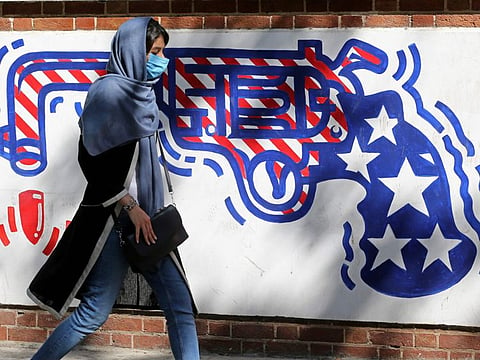Iran says it can set fire to all US bases in region at once
Commander ridicules US bid to forcibly restore United Nations sanctions on Iran

Tehran: The commander of Iran’s Islamic Revolutionary Guard Corps said his country is capable of setting fire to all US bases in the Gulf “at once” , according to an interview on state TV.
General Hossein Salami, the commander of the IRGC - the most powerful and influential branch of Iran’s armed forces - said the US army “is exhausted and doesn’t have the power” to start a ground war with the Islamic Republic.
He also ridiculed a US bid to forcibly restore United Nations sanctions on Iran.
The comments came hours before the US tries to formally invoke a sanctions “snapback” provision from the 2015 nuclear deal, which it withdrew from two years ago, a move that’s widely seen as an effort to kill what’s left of the accord.
The plan, coming in the eve of the UN general assembly, has deepened a chasm between the US and most other nations, including its European allies, who say President Donald Trump’s abrogation of the multinational agreement means he doesn’t have the right to use its provisions.
“Even if the snapback is performed, it will fire blank shots,” Salami said late Saturday. “We will go ahead and take our actions if our rights are not fulfilled within the nuclear deal. We’re not afraid of bluffs, threats and intimidations.”
Relations between the US and Iran have been at their worst since the 1979 Islamic Revolution, and over the past two years have been defined by a security crisis triggered by Trump’s withdrawal from the nuclear deal and culminating in the assassination of top Iranian General Qassem Soleimani in January.
On Tuesday, Trump tweeted that a US retaliation against any attack by Iran would be “1,000 times greater.”
Salami called the threat an “unbelievable exaggeration.” He also rejected reports published earlier this week that Iran was planning to kill the US ambassador to South Africa in retaliation, calling it “ridiculous and laughable” as Iran would not target anyone who wasn’t involved in Soleimani’s killing.
Salami’s comments came within minutes of Foreign Minister Mohammad Javad Zarif ridiculing US “snapback” gambit.
“This is a propaganda trick. There’s no snapback resolution,” Zarif said in the interview with Iranian state TV, adding that Secretary of State Mike Pompeo was still “waiting for the nuclear deal movie to come out in order to find out what the nuclear deal actually is.”
The US asserts that all of the UN resolutions on Iran that were in place before the 2015 deal - from a ban on arm deals to restrictions on the Islamic Republic’s ballistic missile activity and its nuclear enrichment - will go back into effect from midnight on Saturday. To enforce those measures if countries like Russia and China disregard them, the US could use tools such as secondary sanctions on shippers, insurers and banks and may even threaten interdictions of ships at sea.
Zarif said the latest sanctions salvo wouldn’t have any practical impact on Iran’s economy - already hobbled by a raft of US penalties imposed by Trump in 2018, as well as the coronavirus - and the effect would be mostly psychological.
Sign up for the Daily Briefing
Get the latest news and updates straight to your inbox



